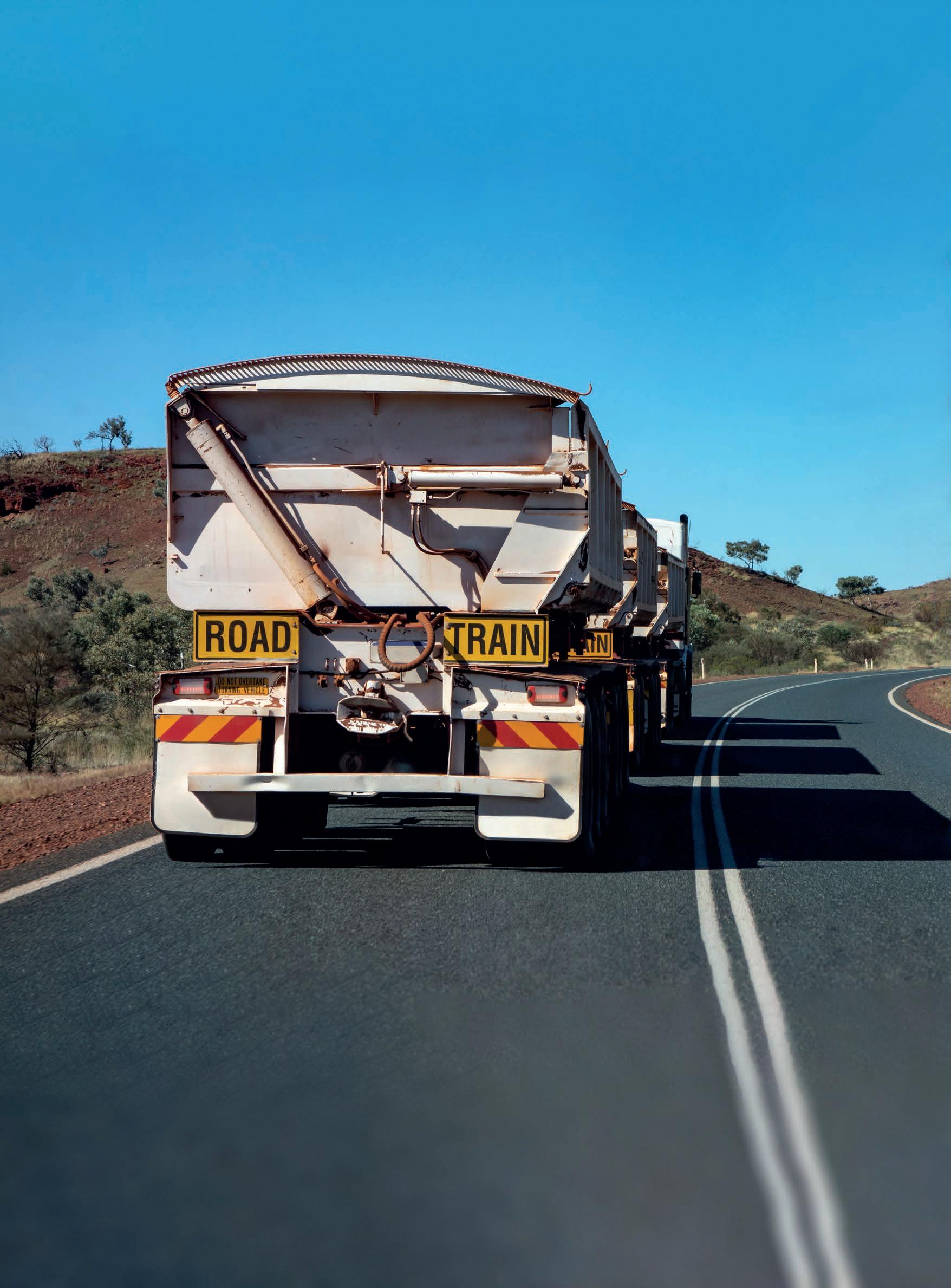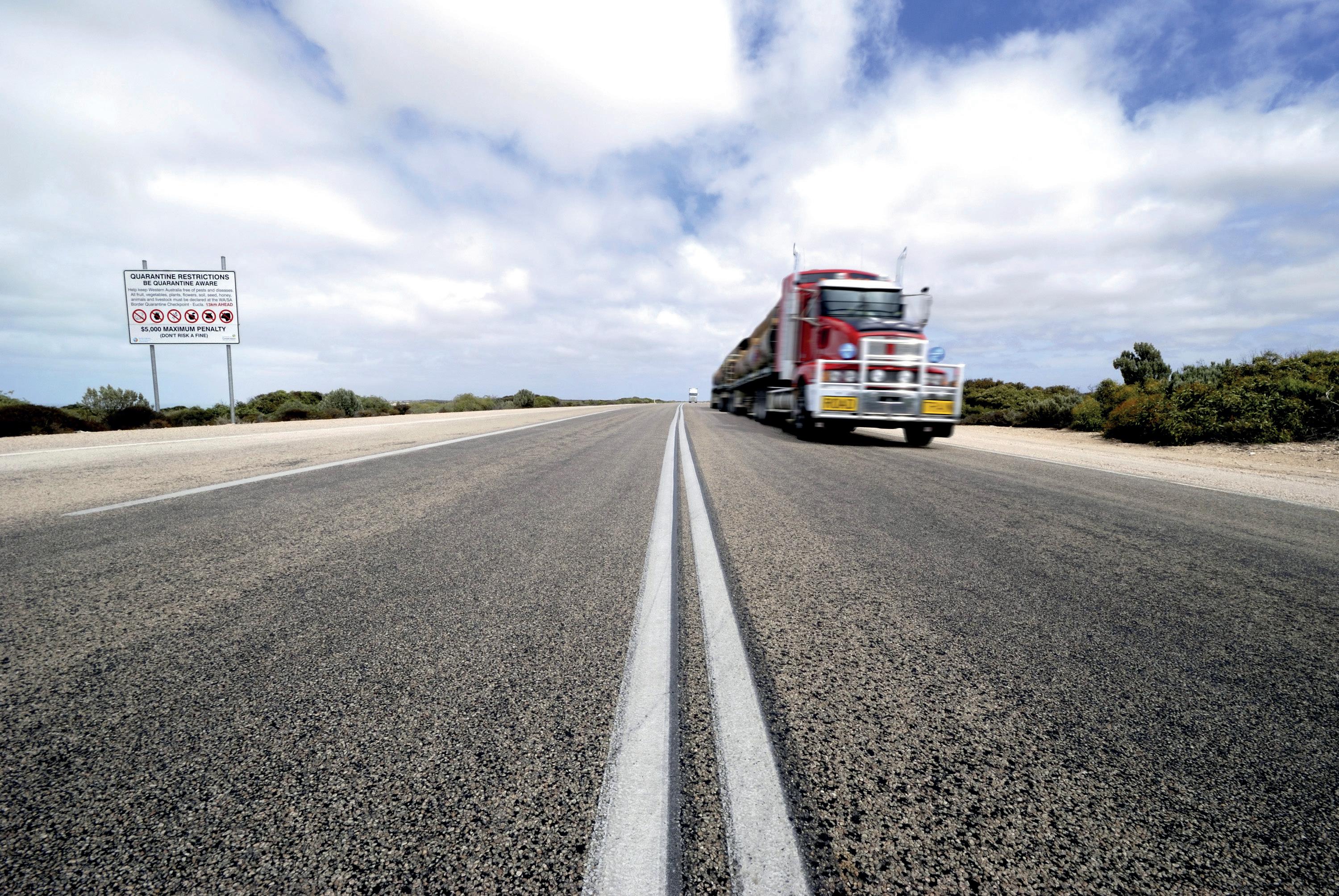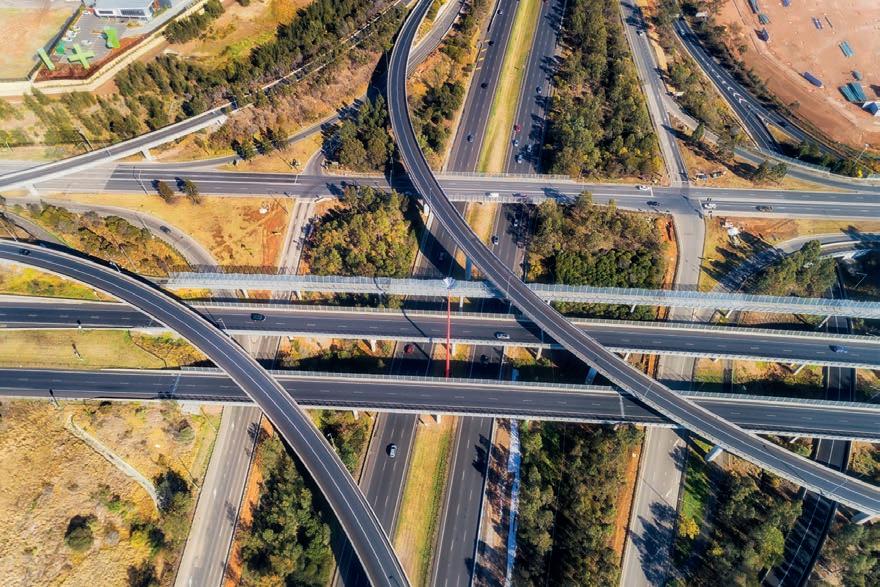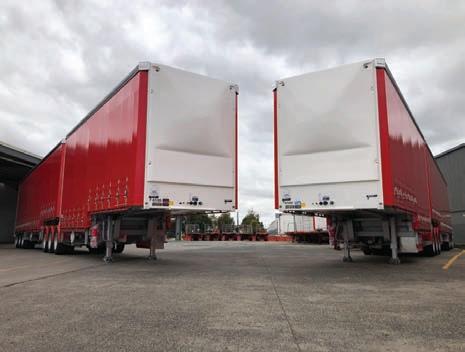
14 minute read
Economy
How will Budget 2022-23 affect the transport industry?
THE PRICE OF FUEL AND A SHORTAGE IN SKILLS IS IMPACTING AUSTRALIA’S ROAD TRANSPORT BUSINESSES. WILL THE BUDGET ALLEVIATE OR COMPOUND THESE ISSUES?
The Federal Government has unveiled a plan for a stronger economic future which is reported to deliver more jobs, and work towards unemployment of below 4.0 per cent; drive investment in stronger defence, borders and security; continue investment in health, education, women’s safety and essential services; relieve some costs for Australians and small businesses; and maintain momentum with investments in roads, rail, dams and renewable energy technology. One of the most relevant changes to come out of this Budget is a 50 per cent reduction on the fuel excise for the next six months. The excise on petrol and diesel will be cut from 44.2 cents per litre to 22.1 cents per litre and is expected to ‘flow’ through to lower petrol prices over the next fortnight. Assistant Minister for Road safety and Freight Transport, Scott Buchholz, said he couldn’t remember a period of time when Australia had such a significant cut to fuel excise. “I welcome the cut to the fuel excise, every time Australians, be it motorists or the transport sector, fill up their tank, for the next six months months,” said Buchholz. “Whether you’re line haul between capital cities or running round the city, it will cost truckies less. “This cut in fuel excise will flow through to the bowser over the next two weeks as retailers replenish their stocks. “In keeping with our strong support for the
sector, we also confirm the temporary full expensing measure to 30 June 2023, which strengthens business investment and creates more jobs.” The Victorian Transport Association (VTA) has welcomed relief on fuel and other costs contained in the Federal Budget delivered last night by Treasurer Josh Frydenberg and will advocate for freight drivers to be added to a list of priority workers eligible for new apprenticeship support. “The halving of the fuel excise from 44 to 22 cents per litre for the next six months will provide immediate relief for road transport operators on their greatest expense, other than wages,” said VTA CEO, Peter Anderson. “While we would have preferred a Road User Charge reduction to ease supply chain cost pressures, we welcome the lower fuel excise, noting it must remain temporary so as not to jeopardise the long term and much needed transport infrastructure it is intended to fund. It is important that operators factor the temporary nature of the reduction into their costs, with the hope that external factors that have pushed prices higher will ease later in the year.” In response to this Budget, the Transport Workers’ Union (TWU) said an absence of targeted fuel cost relief and no action on deadly pressures exacerbated bv Covid and flooding will force workers to park up their trucks. “Transport workers have been doing the heavy lifting over these last few pandemic years,” said TWU National Assistant Secretary, Nick McIntosh. “Rather than help make their difficult jobs easier, Scott Morrison’s given workers the cold shoulder. “Fuel costs are sky-high, and truckies are worried how they’ll break-even – let alone make a profit. Truck owner-drivers and small operators running on the whiff of an oily rag should not be paying any fuel excise while costs are through the roof and the Federal Government has no regulatory mechanism to support their cost recovery. The pittance the Prime Minister’s offering won’t even make a dent in drivers’ astronomical operating costs. “If Scott Morrison seriously wants to end these pressures, he should commit to slashing the fuel excise entirely for truckies and operators as a short-term solution until prices stabilise. “Truckies wouldn’t be in this position if the Federal Government had embraced the industry reform recommended by the Senate over six months ago. The Budget shows we shouldn’t hold our breath for action: There’s no long-term funding to establish an independent body to set enforceable standards and create effective cost recovery. Regulation of this kind would finally end the devastating cost pressures forcing truckies to rush and drive tired, and tragically sending many to early graves. “Without a plan to ease costs or keep workers from getting sick from new covid variants, Australians should brace for supply chain chaos to continue. Any hopes we might finally have support from this LiberalNational Government to protect supply chains have been dashed – it’s clear Scott Morrison just doesn’t care.” McIntosh alludes to recommendations made as part of the Sterle Report which include: The establishment of an independent body that can set binding standards across supply chains with adequate enforcement mechanisms; deal with licensing and skills issues; ensure proper investigatory and data collection in relation to truck crashes as well as treating as workplace injuries; better infrastructure for the transport sector; greater role for technology and telematics including subsidies for operators; cashin-transit industry; the establishment of a

Scott Morrison’s given workers the cold shoulder

transport operator system with Government procurement based on this; and the establishment of a Transport Advisory Group with key stakeholders to advise the Minister. He laments the absence of an independent body like the Road Safety Remuneration Tribunal (RSRT) which was established by the Gillard Government in 2012 and abolished in April 2016. Last week, in his presentation to VTA State conference attendees, McIntosh explained the transport industry in Australia has recorded more than 1,000 deaths since the abolition of RSRT. Also, Transport, Postal and Warehousing consistently leads the Australian Bureau of Statistics (ABS) for the industry with the most bankruptcies. In 2020-21 it was one of only two industries to see a decrease in the number of businesses. He went on to say that transport is everything a ruthlessly efficient free market wants – a price-taking industry with low barriers to entry and a large amount of competition. “Regulation tends to be reactive and piecemeal targeting transport operators and drivers not the wealthy users of transport,” said McIntosh – adding that a shortage of drivers and the employment model are all structural problems but the industry has never been able to agree on the solutions. Other speakers at this year’s VTA State Conference, including Australian Industry Standards CEO, Paul Walsh, and Armstrongs Driver Training CEO, Craig Nicholson, weighed in on the the issue of skilling, training and supporting transport workers. Their involvement with the Victorian Transport Association’s Driver Delivery Program appears to be a positive step in right direction – one which the Government should take a closer look at for the benefit of our industry. The Budget, according to the VTA, also contained important measures to increase workforce participation and address the skills shortages that have been felt throughout the economy. From 1 July, apprentices employed in ‘priority industries’ will be eligible for funding to help offset their training costs, with their employers also eligible for apprenticeship wage subsidies. “The VTA will be advocating very strongly for heavy vehicle drivers to be added to this priority list given the labour shortages that are rife across the industry,” said Anderson. “As we learned from Australian Industry Standards CEO Paul Walsh at the State Conference last week, the pathway to professionalising the heavy vehicle driver is through apprenticeships, underscoring the importance of the government recognising freight drivers as a priority occupation.” The following is a broad overview of what has been announced as part of the 2022-23 Budget:

Cost of living relief
The Government is introducing a new temporary, targeted and responsible cost of living package to take the pressure off household budgets. • One-off Cost of Living Tax Offset – From 1 July this year, more than 10 million individuals will receive a one-off $420 cost of living tax offset. As a result, eligible low- and middle-income earners will be up to $1,500 better off for a single income household, or $3,000 better off for dual income household. • One-off Cost of Living Payment – To help
Australians most in need the Government is providing a one-off, income-tax-exempt payment of $250 to 6 million eligible pensioners, welfare recipients, veterans and eligible concession card holders in
April 2022. • Temporary fuel excise relief – The
Government will reduce fuel excise by 50 per cent for six months. This will see excise on petrol and diesel cut from 44.2 cents per litre to 22.1 cents per litre. The reduction in excise will flow through to lower petrol prices over the next two weeks, as petrol stations replenish their stocks.

Jobs
The Government is investing in measures to expand and upskill the workforce to secure the workers we need now and for the future. It is transforming Australia’s manufacturing sector and building resilient supply chains with over $1 billion in new investment, building on the $1.5 billion Modern Manufacturing Strategy announced in the 2020-21 Budget. It has also committed $2.8 billion to support Australian apprenticeships, building on the $13.3 billion spent on apprenticeships and traineeships since 2013. The Government has committed $3.7 billion in Commonwealth funding for a new skills agreement, which has the capacity to deliver up to 800,000 additional training places for Australians. To develop the next generation of innovative Australian companies, this Budget includes $2.2 billion for a research commercialisation action plan (including $1.6 billion for a new economic accelerator) to bring industries and universities together.
Backing small businesses
Small businesses will have access to a new 20 per cent bonus deduction for eligible external training courses for upskilling employees. The Skills and Training Boost will apply to expenditure incurred from Budget night until 30 June 2024, providing $550 million in tax relief. The Government is also providing $1 billion for a new Technology Investment Boost to encourage small businesses to go digital. Small businesses will be able to deduct a bonus 20 per cent of the cost of expenses and depreciating assets that support digital uptake. Expenditure of up to $100,000 per year will be supported by this new measure, which applies from Budget night until 30 June 2023.
Essential services
A strong economy reportedly enables the Federal Government to guarantee the essential services Australians rely on. Since coming to office, the Government claims it has delivered record levels of

funding for health, aged care, education and disability support. • The Government has allocated $6 billion for the Covid-19 Health response, which includes support for the Governments’
Winter Response Plan to prepare for the next wave of Covid-19 and influenza. • $3.0 billion over five years for cheaper medicines to support a healthier Australia. • $1.3 billion to support delivery of the next
National Plan to End Violence against
Women and Children 2022-32. • $165.0 million for wellbeing programs and $104.2 million for health services to support veterans and families.
Infrastructure
The Government is investing an unprecedented $37.9 billion in regional Australia and priority infrastructure across the nation to create jobs and unlock the economic potential. This includes $7.1 billion for transformative investments including in the Northern Territory, North and Central Queensland, the Pilbara and the Hunter to unlock new economic frontiers of production in agriculture, low emissions manufacturing and renewable energy. The Government has increased its 10-year transport infrastructure pipeline to a record $120 billion with an additional $17.9 billion committed to road, rail and community infrastructure projects supporting around 40,000 jobs. Including through its $8.9 billion National Water Grid Fund, the Government will provide a further $7.4 billion to improve Australia’s water security and open up new land for irrigation. As well as projects in each state and territory, the Government is investing: • $2.0 billion through the Regional
Accelerator Program to drive growth and productivity in regional areas. • $501.7 million for local councils to
deliver priority road and community infrastructure projects across Australia • $2.0 billion in additional funding for the
Northern Australia Infrastructure Facility, bringing total funding to $7.0 billion.

Keeping Australians Safe
The pandemic, the invasion of Ukraine and extreme weather events have and continue to cause enormous disruption according to the Federal Government. To keep Australians safe the Government will: • Increase the Australian Defence Force by up to 18,500 by 2040. • Provide $9.9 billion over 10 years to significantly enhance Australia’s offensive and defensive cyber and intelligence capabilities. • Support households and businesses impacted by recent floods in parts of
Queensland and New South Wales, with over $6 billion expected to be spent. The Federal Government said it has committed a $17.9 billion boost towards new and existing infrastructure projects in every state and territory as part of a 10-year infrastructure investment pipeline which is increasing from $110 billion to a record $120 billion. Key new commitments funded in the 2022–23 Budget include: • $3.1 billion in new commitments to deliver the $3.6 billion Melbourne
Intermodal Terminal Package (VIC), including: – $1.2 billion for the Beveridge Interstate
Freight Terminal in Beveridge, taking the total investment to $1.62 billion; – $280 million for Road Connections, including Camerons Lane Interchange, to the Beveridge Interstate Freight
Terminal; – $740 million for the Western Interstate
Freight Terminal in Truganina; and – $920 million for the Outer Metropolitan
Ring – South Rail connection to the
Western Interstate Freight Terminal. • $1.6 billion for the Brisbane to the
Sunshine Coast (Beerwah-Maroochydore) rail extension (QLD) • $1.121 billion for the Brisbane to the
Gold Coast (Kuraby – Beenleigh) faster rail upgrade (QLD)
Australian Consumer Confidence
17 23
20
10
Apr2021 -7 -6
Jul 2021 10 20
12
Oct 2021 3 13
-12
Jan 2022
25
20
15
10
5
0
-5
-10
-20
4% 82.51% 0.1%
Unemployment rate February 2022 Capacity utilisation February 2022 Interest rate March 2022
• $1 billion for the Sydney to Newcastle – (Tuggerah to Wyong) faster rail upgrade (NSW) • $678 million for Outback Way (NT, WA,
QLD) • $336 million for the Pacific Highway –
Wyong Town Centre (NSW) • $336 million for the Tasmanian Roads
Package – Northern Roads Package –
Stage 2 (TAS) • $200 million for the Marion Road – Anzac
Highway to Cross Road (SA) • $145 million for the Thomas Road – Dual
Carriageway – South Western Highway to
Tonkin Highway and interchange at Tonkin
Highway (WA) • $140 million for Regional Road Safety upgrades (WA) • $132 million for Central Australian
Tourism Roads (NT) • $120 million for the Adelaide Hills
Productivity and Road Safety Package (SA) • $46.7 million towards the Athllon Drive
Duplication (ACT) The Budget also includes additional funding for existing projects and Roads of Strategic Importance corridors, including: • $2.264 billion for the North South
Corridor – Torrens to Darlington (SA) • $352 million for the Milton Ulladulla
Bypass (NSW) • $320 million for the Bunbury Outer Ring
Road (Stages 2 and 3) (WA) • $200 million for the Tonkin Highway Stage 3 Extension (WA) • $45 million for the Ballarat to Ouyen –
Future Priorities (VIC) • $68.5 million for the Cooktown to Weipa
Corridor Upgrade bringing the total
Australian Government funding to the corridor to $258.5 million (QLD) “With the unemployment rate already at an equal 48 year low, the measures in this Budget will create an additional 40,000 jobs across Australia, building on our world leading economic recovery,” said Treasurer, Josh Frydenberg. “By enhancing transport connectivity, we’re strengthening our supply chains against challenges such as Covid-related disruptions and the impact of natural disasters. “This gives businesses and consumers the confidence and certainty they need in uncertain times.” Anderson said transport infrastructure investments are critical for attaining better intermodal connectivity in freight networks, which will ultimately benefit every mode of transport. Also, notwithstanding the measures in the budget to alleviate cost of living pressures, Australian businesses – including freight operators – will continue to face enormous challenges over the coming months. “Expected higher inflation and interest rates may well offset some of the temporary relief in the budget, so it is important to be vigilant in identifying higher business costs and passing them through the supply chain,” said Anderson. “The VTA offers members numerous resources to assist members in understanding how price fluctuations might impact their business. Please contact our secretariat on 03 9646 8590 for information on how to access these resources.”
TRANSPORTEQUIPMENTRENTALS
1300RENTCO | www.rentco.com.au
RENTCO ON THE MOVE












